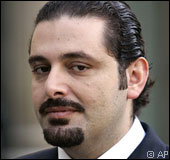 By Nora Boustany, Saad Hariri , a Lebanese legislator and the son of slain prime minister Rafiq Hariri , said Wednesday that a recently renewed alliance between Iran and Syria and fallout from Tehran’s nuclear program could pose a threat to Lebanon."There is an international crisis on this issue. They will have to answer to the international community, not Lebanon," he said at a leadership forum at the Woodrow Wilson International Center for Scholars.
By Nora Boustany, Saad Hariri , a Lebanese legislator and the son of slain prime minister Rafiq Hariri , said Wednesday that a recently renewed alliance between Iran and Syria and fallout from Tehran’s nuclear program could pose a threat to Lebanon."There is an international crisis on this issue. They will have to answer to the international community, not Lebanon," he said at a leadership forum at the Woodrow Wilson International Center for Scholars.
Hariri came to Washington this week to meet with President Bush , Vice President Cheney , Secretary of State Condoleezza Rice , national security adviser Stephen J. Hadley and the assistant secretary of state for Near Eastern affairs, C. David Wel c h .Iran’s standoff with international institutions over its nuclear ambitions could have an impact on Lebanon, Hariri said, given the armed presence in the country of Hezbollah. Lebanon should be spared possible repercussions, he said.
Under pressure from Syria, cabinet members belonging to Hezbollah and the mainstream Shiite Amal movement have suspended their participation, in protest against Lebanese requests that the U.N. inquiry into Hariri’s killing be widened to include a recent wave of political assassinations.
"I don’t believe Hezbollah and Amal hold the interests of regional powers over those of Lebanon," Hariri said when asked whether the two Shiite movements would rock regional stability on behalf of Iran. "There are difficult problems to be solved and discussed, but what was taboo is out in the open." Though small, Lebanon was the only true democracy in the Arab world, and it had many values other than instability to export to its neighbors, he said.
"He who differs with the principle of putting Lebanon first will put himself at odds with the parliamentary majority," Hariri told participants in the forum, which was titled "The Future of Democracy in Lebanon."
Hariri said he harbored no animosity toward Syrians but stressed that Syria’s cooperation with the U.N. probe of his father’s assassination last February was imperative.
"We want the truth, not revenge. We are a people who believe that freedom is the only way of life. If they have not committed a crime, why not cooperate?" he said. "The quicker the process, the quicker this problem can be solved. I’ve always said we will accept any result from the U.N. commission. If it said people from Mars committed this crime, I will accept it. But this crime was not committed by anyone from Mars."
Nicolas Michel , U.N. undersecretary for legal affairs, headed to Beirut this week to study the feasibility of creating an international court to try those charged with the killing. Michel is also expected to examine whether the U.N. investigation should cover bombings in Lebanon that forced leading politicians such as Hariri to remain abroad.
Hariri said initial reports on the investigation, which was previously headed by Detlev Mehlis , a German judge, "outlined Syrian involvement." Hariri said information that former Syrian vice president Abd u l Halim Khaddam divulged to Mehlis this month was "extremely" critical. Khaddam had publicly exposed Syrian officials who had threatened the elder Hariri for resisting Syrian domination.
"We ask for people who committed this crime to be punished," Hariri said. "If those who did it escape with their crime, then all is lost in the region. If they are found out and punished, this sends a very strong message for the future. They will pay the price no matter who they are and how high they are."



